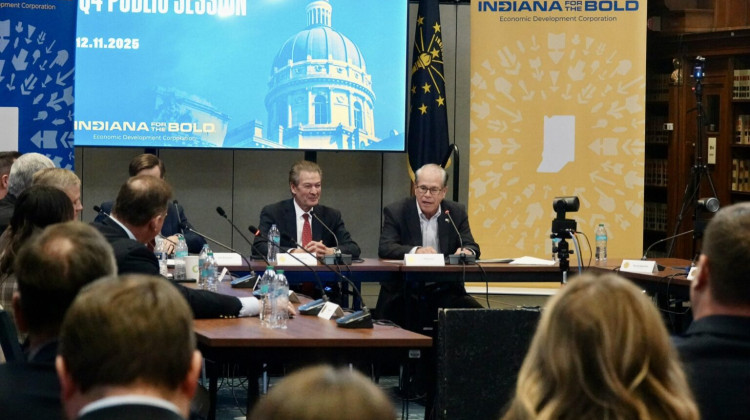A new tool created by a central Indiana police department was designed to assist in emergency situations. The AWARE program involves displaying a four-inch circular decal at a home or on a car where the occupant may exhibit confusion or unsure of their surroundings. WFYI’s Terri Dee speaks with Avon Police Department Deputy Chief Brian Nugent about the program’s purpose and how officers utilize the decal to assess a police call.
WFYI Reporter, Terri Dee: How often does law enforcement and first responders encounter situations where the AWARE program is needed?
Deputy Chief, Avon Police Deparment, Brian Nugent: That's a fantastic question. Because the reality is, we're unsure of what that call volume looks like. You know, there's a lot of calls for service that officers are responding to, that they simply have no understanding or awareness that the individual they're speaking with, does have a cognitive disability or an impairment. I think that's the the platform that the AWARE program seeks to establish is, letting us know that we're encountering individuals that are in need of a little different approach or a little bit of an extra effort by first responders.
Dee: Can you provide some examples where the AWARE program would be utilized?
Nugent: Caregivers, loved ones, clients, consumers, anybody that tends to define themselves in a struggle and communication; may struggle with comprehension. Ultimately, our concern is someone that may struggle with compliance when speaking to law enforcement or an EMS or fire service member during an emergency. The goal is to help officers identify when they make a vehicle stop, or fire and EMS when they respond to a vehicle incident, as they're approaching that scene, these emblems can empower first responders to have a visual recognition, that this emblem that's present on this car is a possible indication that someone in that vehicle or someone at that home may struggle with things like communication, comprehension, or compliance.
Dee: Someone that has epilepsy having a seizure, or someone that has mental health challenges; so would those situations fall under the category of the AWARE program to be effective?
Nugent: Absolutely. You know, one of the examples that we've included on the medical referral form is hypoglycemia. If anybody has struggles with diabetes, or understanding what hypoglycemia can be, it's a very common misinterpretation of what law enforcement see in the sense that someone is experiencing a moment where hypoglycemia is a part of their medical impairment, that behavior has been characterized to be drunk-like. The person can start to have slurred speech. The person can have poor manual dexterity. But one of the questions we want to start asking people during those situations are; are you diabetic, you know, have you taken your insulin? When you have someone that has epilepsy, and they have a tendency to have a drop of their ability to communicate effectively, they may have seizures. Even if it's as simple as an officer makes a vehicle stop, as there may be someone in that vehicle that has autism; someone that vehicle may have dementia and so it just kind of helps open up the door of conversation.
Dee: Has there been any discussion to collaborate with the Indianapolis Metropolitan Police Department (IMPD) with this program?
Nugent: So right now, the Central Indiana Police Foundation has been very gracious and they have funded the initial launch. Their board of directors have asked that we maintain the program in Hendricks County as a pilot program. We have received several phone calls from residents in Indianapolis as well as some leadership with the Indianapolis Metropolitan Police Department and so we're going to try to communicate those requests to expand the program through the Central Indiana Police Foundation. Our ambition is to certainly expand this program to any agency community that feels like it could help them in any way that's possible.
Dee: Thank you for sharing this information today.
Nugent: I appreciate the opportunity. Thanks for your time.
Contact WFYI All Things Considered newscaster and reporter Terri Dee at tdee@wfyi.org.
 DONATE
DONATE









 Support WFYI. We can't do it without you.
Support WFYI. We can't do it without you.